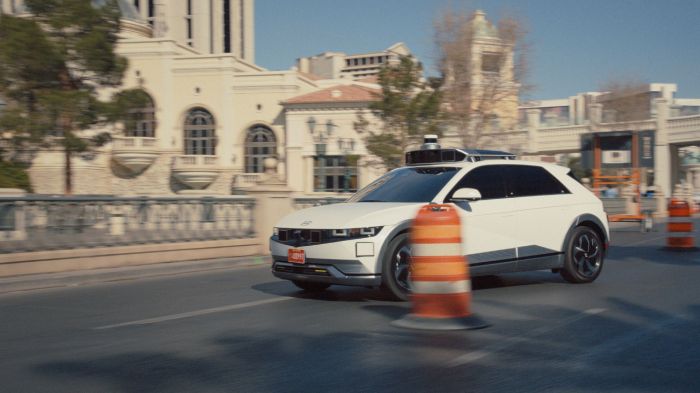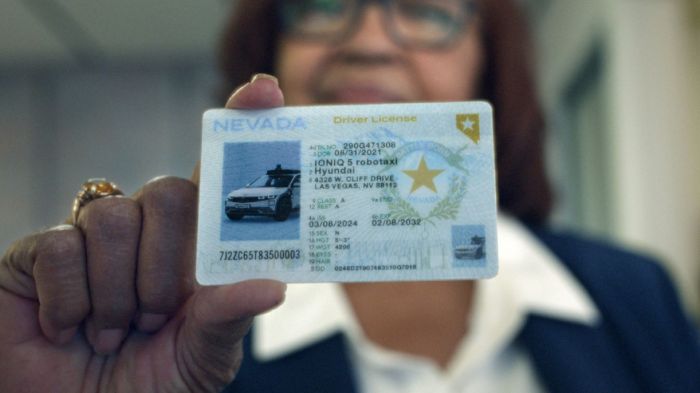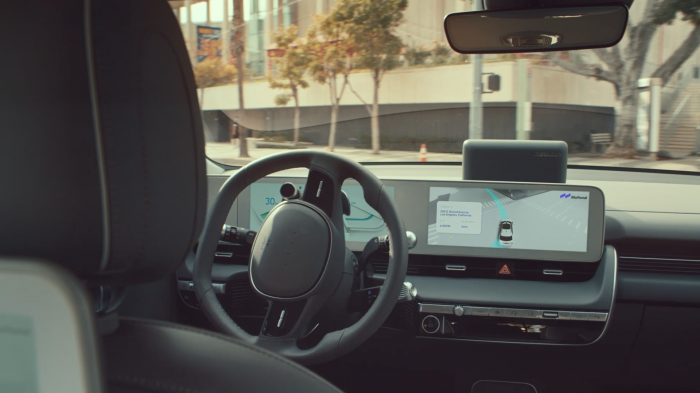[ad_1]
Photo credits ‘Hyundai’
Hyundai Motor Company’s IONIQ 5 robotaxi has achieved new advancements, by becoming the first autonomous car to pass the national DMV driving exam – not only showcasing new safety standards in driverless vehicle technology, but taking one young visually impaired woman in to a new realm of discovery and freedom.
A new short film by creative agency Jung von Matt, shows how the driverless car was pushed to the limit in Las Vegas by an official DMV driving examiner, undergoing a comprehensive road test around Las Vegas. The surprising result shows how Hyundai’s IONIQ5 robotaxi passes the test with a perfect score.

The storyline of the film, directed by Park Pictures’ Daniel Mercadante, features a visually impaired woman, Pearl Outlaw, and her mother Ruth. Pearl’s condition, Retinitis Pigmentosa, prevents her from obtaining a driver’s license. Their moving personal story illustrates how Hyundai’s autonomous driving technology will help Pearl in the future by transforming her daily transportation challenges into new lifelong discoveries outside of her home. Pearl had previously been a World Championship rower until her eyesight started to deteriorate.
The goal of the new initiative by Hyundai is to change widely-held perceptions of autonomous driving technology, which currently suffers from a lack of trust in comparison with human drivers, and to show how it can benefit people’s daily lives enormously. The story of Pearl underlines how Hyundai is committed to designing driving solutions that enhance the quality of life for individuals unable to drive independently, aiming to empower them with greater autonomy and mobility.

In the film, the Hyundai IONIQ5 robotaxi navigates its way through an official driving evaluation, autonomously performing maneuvers under the watchful scrutiny of Kandice Jones, a certified driving examiner with the Nevada Department of Motor Vehicles, who, in her career as an examiner, has failed almost 84% of student drivers.
In the driving test, conducted by the highly experienced professional examiner, the IONIQ 5 robotaxi excelled, impressing with its speed control, lane changes and maneuvering, its ability to accurately stop at a stop sign, perform left turns, and its reaction time to developing hazards.

To Kandice’s surprise, the vehicle not only met but exceeded expectations, achieving a flawless score.
This achievement underscores the robotaxi’s reliability and safety, opening a new era of trust and empowerment that could transform millions of lives. The film underlines how technological advancement holds particular promise for individuals like Pearl and those with physical or mental limitations, who might never have the chance to undergo a driving test. After experiencing the IONIQ5 robotaxi firsthand for herself after the driving examination, Pearl’s journey symbolizes the potential for enhanced independence through innovation, offering a glimpse into a future where technology broadens horizons for everyone.
“As a company that pursues freedom of mobility, we at Hyundai aim to exhibit the safety and trustworthiness of the IONIQ 5 robotaxi through this very campaign,” said Sungwon Jee, Senior Vice President and Global Chief Marketing Officer at Hyundai Motor Company. “We will continue our efforts to raise awareness about our AI-based autonomous driving technology, which is set to provide positive changes to the everyday lives of our customers.”
The IONIQ 5 robotaxi is the embodiment of transformative technologies in mobility coming together in one vehicle. It signifies the extensive collaboration between Hyundai Motor Group and autonomous driving technology developer Motional, spanning years of development and rigorous testing of advanced automotive platforms and self-driving technology. The IONIQ 5 robotaxi achieves consistent driving performance in various driving environments thanks to its suite of advanced sensors, combining LiDAR, radar and cameras.
According to the U.S. Department of Transportation, over 5 million people in the U.S. are unable to drive due to a mental or physical condition. According to the American Automobile Association, 73% of Americans do not trust self-driving cars.
![]()
[ad_2]
Source link




